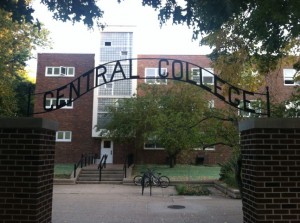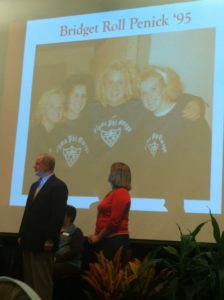This past weekend was a whirlwind of floats (the kind you ride, not the kind you drink), football, friends, and fun. It was Homecoming weekend for my hometown and for my college town as well. On Friday, the day started with a pep rally at the elementary school where I teach, followed by a football victory and ending with a stop at one of the class reunion parties. Saturday, I rose bright and early and headed off to Pella, Iowa, home of Central College, my beloved alma mater. It was my fifteen-year reunion and my sister was receiving an Alumni Award, so I simply had to be there. After the tailgate and another football victory (Go Dutch!) but before the reunion for the Class of 1997, there was a ceremony in which a handful of individuals–including my sister–received their awards.
Honestly, I didn’t expect much from the ceremony. I figured that the President of our college would say a few kind words, pass out the hardware, possibly make a quick fundraising pitch and then get us out of there to attend the various after-parties. Instead, President Putnam, who is a featured writer for A Better Iowa and will soon be a regular contributor to The Huffington Post, posed a question about the current state of higher education: Is education a transaction or a relationship?
Putnam continued by observing that there is a marketing campaign in this country that pushes “doing college in your pajamas,” a reference to online courses. In fact, according to a 2011 study by the Babson Survey Research Group in Wellesley, Massachusetts, more than six million students were taking at least one online course in 2010, an increase of 560,000 students over the prior year. This number is confirmed by the National Center for Education. In a study released in April, 2012, the NCE reported that 6.1 million students took a class online in 2010 from one of nearly 300 accredited online universities. The University of Phoenix alone boasts over half a million students.
Of course, many of those taking courses online are doing so in order to advance in their current jobs or to get a degree beyond their undergraduate degree, although 34% of American universities offer a bachelor’s degree online. Adults take these courses because they fit into their schedules of work kids, and other commitments. For them, education is primarily a transaction and they are okay with that. In exchange for a tuition check and a lot of hard work done individually, for the most part, they receive a degree or endorsement that helps them move up the ladder professionally. Personally, I earned my English as a Second Language endorsement without ever having to set foot on an actual college campus.
That is all well and good for adults going back to finish up or add onto their prior undergrad experiences, but is it right for young adults just beginning their educational journey? According to Putnam, “You can load ‘em up with advanced credits in high school, shrink this [college] down to two years, stamp their ticket and give them a BA. And the nation will suffer. It will suffer.” Obviously, he believes strongly, passionately that education is a relationship, not a mere transaction.
At Central, President Putnam has put into place what he calls “Integrated Learning.” Every class has a class dean who stays with them for the course of their four-year academic career. Each class also has a class director to help create experiences tailored to that particular group and year. For instance, freshmen have programs to help them acclimate to college life away from family, juniors have programs to support them as they participate in study abroad programs (a cornerstone of the college experience at Central), seniors receive support in pursuing careers post-graduation, etc. Despite his preference for personal, face-to-face educational experiences, Putnam does not shy away from technology. He embraces it, pointing out that, in many classes, students use Skype to communicate about their class work, as well as tweeting and posting messages on social forums, engaging in online discussions relating to what happens in class. He believes technology is vital to transforming the educational experience for young adults, not merely for expediting the process.
Having an actual home campus, as well as opportunities to participate in team sports and organizations, is part of what makes college a relationship rather than a transaction.

Having an actual home campus, plus opportunities to participate in team sports and organizations, is part of what makes college a relationship vs. a transaction.
Putnam points out that the classroom is important, but is one of many experiences vital to today’s college student. Group projects that get students out of the classroom and into real world experiences and applications are key, but he would say that the other experiences are just as important. Participating in athletic programs gives students opportunities for developing leadership skills and learning to cooperate as a team, focused on a goal larger than themselves. The same can be said of the many service organizations on campus. As previously mentioned, Central has a robust study abroad program with locations in Mexico and across Europe. Doing business in Spain, using the native language and currency, is an experience that cannot be recreated online with the same fidelity and authenticity.
Of course, Central is just one college, but the question is applicable to nearly all academic institutions nationwide: Is education a transaction or a relationship? Every alumni award recipient spoke of his or her achievements post-undergrad, but also shared stories of particular professors who inspired them and many shared stories about how they met their spouses or their lifelong best friends through their college experiences. As President Putnam observed, with technology we can offer up all kinds of academic programs that will reach people who may otherwise be unable to participate in the college experience. Ultimately, though, can these experiences every truly take the place of being there?




2 comments
“Online Degrees” can get a person the certification of proficiency
in a career field-But the social interaction of a campus-based
education gives a person the ability to relate with others–a VERY vital part of succeeding in the workplace. Like clinical Spanish
versus conversational Spanish.
Doug, I think this is so true. There’s something critical about the social development that happens in college – including a technical school or apprenticeship – that is especially important for 18 to 25-year-olds. Also, congrats on Bridget’s award!